Sin and Salvation in Reformation England(English, Hardcover, Willis Jonathan)
Quick Overview
Product Price Comparison
Notions of which behaviours comprised sin, and what actions might lead to salvation, sat at the heart of Christian belief and practice in early modern England, but both of these vitally important concepts were fundamentally reconfigured by the reformation. Remarkably little work has been undertaken exploring the ways in which these essential ideas were transformed by the religious changes of the sixteenth-century. In the field of reformation studies, revisionist scholarship has underlined the vitality of late-medieval English Christianity and the degree to which people remained committed to the practices of the Catholic Church up to the eve of the reformation, including those dealing with the mortification of sin and the promise of salvation. Such popular commitment to late-medieval lay piety has in turn raised questions about how the reformation itself was able to take root. Whilst post-revisionist scholars have explored a wide range of religious beliefs and practices - such as death, providence, angels, and music - there has been a surprising lack of engagement with the two central religious preoccupations of the vast majority of people. To address this omission, this collection focusses upon the history and theology of sin and salvation in reformation and post-reformation England. Exploring their complex social and cultural constructions, it underlines how sin and salvation were not only great religious constants, but also constantly evolving in order to survive in the rapidly transforming religious landscape of the reformation. Drawing upon a range of disciplinary perspectives - historical, theological, literary, and material/art-historical - to both reveal and explain the complexity of the concepts of sin and salvation, the volume further illuminates a subject central to the nature and success of the Reformation itself. Divided into four sections, Part I explores reformers' attempts to define and re-define the theological concepts of sin and salvation, while Part II looks at some of the ways in which sin and salvation were contested: through confessional conflict, polemic, poetry and martyrology. Part III focuses on the practical attempts of English divines to reform sin with respect to key religious practices, while Part IV explores the significance of sin and salvation in the lived experience of both clergy and laity. Evenly balancing contributions by established academics in the field with cutting-edge contributions from junior researchers, this collection breaks new ground, in what one historian of the period has referred to as the 'social history of theology'.


